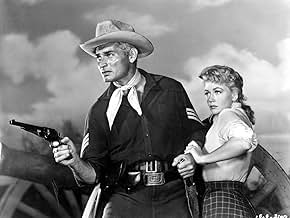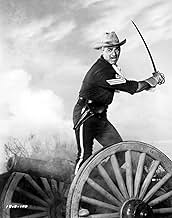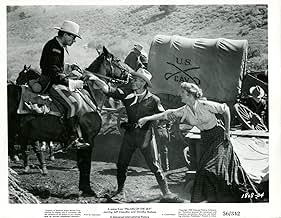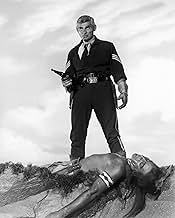NOTE IMDb
6,2/10
831
MA NOTE
Ajouter une intrigue dans votre langueIn 1868 Oregon, after the Army violates the treaty by building a road across the reservation, several tribal chiefs decide to unite their forces against the trespassing whites.In 1868 Oregon, after the Army violates the treaty by building a road across the reservation, several tribal chiefs decide to unite their forces against the trespassing whites.In 1868 Oregon, after the Army violates the treaty by building a road across the reservation, several tribal chiefs decide to unite their forces against the trespassing whites.
- Réalisation
- Scénario
- Casting principal
Avis à la une
Slow-paced story gets off to a ponderous start with too much talk and too little action, with only some gorgeous scenery for eye comfort. The fault seems to be George Marshall's sluggish direction of a uniformly bland cast.
All of the actors go through their paces in rather standard roles, including JEFF CHANDLER, KEITH ANDES, WARD BOND and LEE MARVIN and for a western that promises some action when the plot thickens, it's a good half-hour before the conflict between cavalry and Indians provides any thrills.
DOROTHY MALONE has the only substantial female role, as a woman no longer in love with her husband. In make-up and hairstyle, she looks and acts more as though she's a woman of modern times rather than frontier days. The romantic triangle (Malone, Chandler, Andes) is a weak one.
The big set piece is the Indian attack that occurs an hour into the film and wipes out most of the command. It's well staged and vigorously mounted for western action. But it comes too late to alter the slow pacing of most of the story which is either Marshall's or the scriptwriter's fault.
A minor quibble: All of the night scenes have a soundstage look to them, in sharp contrast to all the daytime locations.
Summing up: Lackluster western needed the John Ford touch from George Marshall, with Lee Marvin and his Irish accent less than credible in the sort of supporting role Victor McLaglen usually played. Nothing more than average.
All of the actors go through their paces in rather standard roles, including JEFF CHANDLER, KEITH ANDES, WARD BOND and LEE MARVIN and for a western that promises some action when the plot thickens, it's a good half-hour before the conflict between cavalry and Indians provides any thrills.
DOROTHY MALONE has the only substantial female role, as a woman no longer in love with her husband. In make-up and hairstyle, she looks and acts more as though she's a woman of modern times rather than frontier days. The romantic triangle (Malone, Chandler, Andes) is a weak one.
The big set piece is the Indian attack that occurs an hour into the film and wipes out most of the command. It's well staged and vigorously mounted for western action. But it comes too late to alter the slow pacing of most of the story which is either Marshall's or the scriptwriter's fault.
A minor quibble: All of the night scenes have a soundstage look to them, in sharp contrast to all the daytime locations.
Summing up: Lackluster western needed the John Ford touch from George Marshall, with Lee Marvin and his Irish accent less than credible in the sort of supporting role Victor McLaglen usually played. Nothing more than average.
Pillars of the Sky (AKA: The Tomahawk and the Cross) is directed by George Marshall and adapted to screenplay by Sam Rolfe from the novels "Frontier Fury" & "To Follow a Flag" written by Will Henry. It stars Jeff Chandler, Ward Bond, Dorothy Malone, Keith Andes and Lee Marvin. A Technicolor/CinemaScope production, photography is by Harold Lipstein and music is by Joseph Gershenson.
Oregon County 1868, and the Native Indian tribes have been shunted on to government sanctioned reservations. As the U.S. troops arrive to lay the roads through Indian territory for new settlers, the Indian chiefs decide to fight back. Led by Chief Kamiakin (Michael Ansara), the Indians attack leaving the army short on numbers, all that's left is a small band of soldiers and some civilians. Can they survive on guts and religious comfort alone?
It was originally intended to be made with John Ford directing and John Wayne starring, but come 1956 the pair were unable to commit to the production. They had another Western to make that year, The Searchers! Plot is familiar for Pillars of the Sky, but the even handed portrayal of the Indians and a pro-Christian bent in the narrative, lifts it out of the ordinary. Picture is further boosted by some excellent action sequences that are skilfully crafted by director Marshall (Destry Rides Again/How the West Was Won). Indian attacks, via horseback or flaming arrows assault, considerably raise the pulse, while the sight of the army desperately trying to conquer the rocky terrain while under attack is a bona fide piece of Oater grit. With the exteriors actually filmed on location in Oregon at Joseph & La Grande, the backdrop is gorgeous, expertly brought to life in Technicolor "Scope" by Lipstein (No Name on the Bullet/Von Ryan's Express). While Gershenson (Horizons West/The Man from the Alamo) scores it with genre compliant riffs on Cavalry marches and Indian flavouring.
That it isn't better known or thought of higher comes down to a so so set of acting performances and a pointless love triangle that pads the picture out with boorish periods of chat. Malone, looking beautiful as per usual in colour, is basically a token character, who serves only to be a romantic interest that causes friction between Chandler and Andes. In fact her dialogue is minimal. Marvin has only a small role, and he offers up a quite poor Irish accent as well, while Andes fails to convince. Chandler does cut a decent rugged figure, portraying First Sergeant Emmett Bell as a man you would fight alongside, but it's a performance that lacks charisma, something that Duke Wayne no doubt would have brought to the role. It's left to Bond to take the acting honours, where in an unusually restrained role for him as strongly Christian Dr. Joseph Holden, he gives good value for money as he plays it out with stoic nobility.
With a great DVD transfer and the correct aspect ratio used, the film looks absolutely terrific. It has flaws for sure, but it comes easily recommended to the Western fan. 7/10
Oregon County 1868, and the Native Indian tribes have been shunted on to government sanctioned reservations. As the U.S. troops arrive to lay the roads through Indian territory for new settlers, the Indian chiefs decide to fight back. Led by Chief Kamiakin (Michael Ansara), the Indians attack leaving the army short on numbers, all that's left is a small band of soldiers and some civilians. Can they survive on guts and religious comfort alone?
It was originally intended to be made with John Ford directing and John Wayne starring, but come 1956 the pair were unable to commit to the production. They had another Western to make that year, The Searchers! Plot is familiar for Pillars of the Sky, but the even handed portrayal of the Indians and a pro-Christian bent in the narrative, lifts it out of the ordinary. Picture is further boosted by some excellent action sequences that are skilfully crafted by director Marshall (Destry Rides Again/How the West Was Won). Indian attacks, via horseback or flaming arrows assault, considerably raise the pulse, while the sight of the army desperately trying to conquer the rocky terrain while under attack is a bona fide piece of Oater grit. With the exteriors actually filmed on location in Oregon at Joseph & La Grande, the backdrop is gorgeous, expertly brought to life in Technicolor "Scope" by Lipstein (No Name on the Bullet/Von Ryan's Express). While Gershenson (Horizons West/The Man from the Alamo) scores it with genre compliant riffs on Cavalry marches and Indian flavouring.
That it isn't better known or thought of higher comes down to a so so set of acting performances and a pointless love triangle that pads the picture out with boorish periods of chat. Malone, looking beautiful as per usual in colour, is basically a token character, who serves only to be a romantic interest that causes friction between Chandler and Andes. In fact her dialogue is minimal. Marvin has only a small role, and he offers up a quite poor Irish accent as well, while Andes fails to convince. Chandler does cut a decent rugged figure, portraying First Sergeant Emmett Bell as a man you would fight alongside, but it's a performance that lacks charisma, something that Duke Wayne no doubt would have brought to the role. It's left to Bond to take the acting honours, where in an unusually restrained role for him as strongly Christian Dr. Joseph Holden, he gives good value for money as he plays it out with stoic nobility.
With a great DVD transfer and the correct aspect ratio used, the film looks absolutely terrific. It has flaws for sure, but it comes easily recommended to the Western fan. 7/10
This fine western is a cavalry-Indian affair that has the usual treaty-breaking by the government as it builds a road and fort on Indian land that causes an uproar and leads to war. The military's action sets in motion cavalry-Indian hostilities and the tribes gather for an attack on the fort. Many of the Indians have been baptised and converted to Christianity by a white missionary and live in peace with the soldiers, many serving as scouts under a sergeant played by Jeff Chandler. Complicating matters are two white women the Indians hold as hostages who are at great risk should war break out. Chandler did some his best work in westerns and is the lieutenant whom the Indian soldiers respect and follow faithfully. Chandler's flirtation with a married woman, played by Dorothy Malone, doesn't have much to do with the story other than to give the leading man a romantic interest. Ward Bond, Michael Ansara and Keith Andes are good in supporting roles. Oregon's scenic beauty is on display in this CinemaScope film.
This is the story of Sgt. Emmet Bell (Jeff Chandler) who found his weakness in the arms of another man's woman (Dorothy Malone) and his strength in the power of another man's God . In Oregon Country , 1868 , numerous tribes of Native Americans with Biblic and Evangelist names have been placed on a reservation north of the Snake River . Here a priest called Holden (War Bond) , has constructed a church , and many of the tribes have accepted Christianity and Christian names such as Samuel , Aaron , Abraham , Jacob ; in fact , the three Indian chiefs hold Christian names : Elias , Isaias and Zacarias . But the White Men are building a bridge that across the river to Indian territory to areas north . When the cavalry, under the command of Col. Stedlow (Willis Bouchey) and Capt. Tom Gaxton (Keith Andes) arrive they intend to make peace but the tribal chiefs feel their treaty has been violated . As the cavalry column advances into the reservation , Kamiakin (Michael Ansara) carries out razzias against the US Cavalry and settlements .
A-Universal-International-Picture gets Western action , shootouts , a triangular love story , breathtaking Indian raids on Yankees regiments and results to be quite entertaining . This moving movie is an epic portrait of the thrilling story about several tribal chiefs decide to unite their forces against the trespassing whites who open a road across the reservation and are building a bridge crossing their lands . It's a medium budget film with good actors , technicians , production values and pleasing results . At the ending , when takes place the Indian assault , possesses all the sweep , grandeur and noisy action of the greatest Westerns of an age long past . The picture contains spectacular charges of Indian riders , including an overwhelming final when the US soldiers are besieged at a church turned into a strongly defended fort . Nice acting from a great cast . As Jeff Chandler is good as a honorable and Cristian Sergeant who is in charge of maintaining order and attempts to keep the peace between US cavalry and Indians . Chandler gives stature to the role , providing sincerity and bravura . Chandler was famous , until his early death , for playing Indian chief Cochise , a dignified portrait well shown in : ¨Broken arrow¨ , ¨Battle of Apache Pass¨ and ¨Taza , son of Cochise¨ . Although Chandler also played all kinds of genres , such as : ¨Return to Peyton Place¨(drama) , ¨Flame of Araby¨ (adventure) , ¨Merrill's marauders¨ (wartime , in his last film) , until his early death at 42-year-old . Dorothy Malone as gorgeous and pleasant wife , proves to be a great actress , as usual . And support cast is frankly excellent , such as : Ward Bond , Keith Andes , Lee Marvin , Sydney Chaplin, Olive Carey and special mention for the veteran Willis Bouchey as well as Michael Ansara as violent Indian chief vowing to lead the tribes in battle against the encroaching white men . This exciting and stirring Western was beautifully photographed in Cinemascope , print in Technicolor by Harold Lipstein , Universal's ordinary cameraman. And an original and shining score from William Lava and Heinz Roemheld , though uncredited .
This motion picture was professionally directed by George Marshall in colorful style , though has a few flaws . He realized a great number of films , especially Westerns . His first Western was ¨Wild Gold¨(1934) and he subsequently directed ¨Destry rides again¨ with James Stewart and Marlene Dietrich in which years later he would make a remake titled ¨Frenchie¨ with Audie Murphy and Marie Blanchard . As George Marshal introduces hilarious elements and amusement in his Westerns , such as ¨Texas¨ , ¨Fancy pants¨, ¨Advance to the rear¨, and also directs Musical Westerns as ¨Red Garters¨ and ¨The second greatest sex¨ . Being particularly known for his co-direction of the epic Western ¨How the west was won¨ along with Henry Hathaway and John Ford .
A-Universal-International-Picture gets Western action , shootouts , a triangular love story , breathtaking Indian raids on Yankees regiments and results to be quite entertaining . This moving movie is an epic portrait of the thrilling story about several tribal chiefs decide to unite their forces against the trespassing whites who open a road across the reservation and are building a bridge crossing their lands . It's a medium budget film with good actors , technicians , production values and pleasing results . At the ending , when takes place the Indian assault , possesses all the sweep , grandeur and noisy action of the greatest Westerns of an age long past . The picture contains spectacular charges of Indian riders , including an overwhelming final when the US soldiers are besieged at a church turned into a strongly defended fort . Nice acting from a great cast . As Jeff Chandler is good as a honorable and Cristian Sergeant who is in charge of maintaining order and attempts to keep the peace between US cavalry and Indians . Chandler gives stature to the role , providing sincerity and bravura . Chandler was famous , until his early death , for playing Indian chief Cochise , a dignified portrait well shown in : ¨Broken arrow¨ , ¨Battle of Apache Pass¨ and ¨Taza , son of Cochise¨ . Although Chandler also played all kinds of genres , such as : ¨Return to Peyton Place¨(drama) , ¨Flame of Araby¨ (adventure) , ¨Merrill's marauders¨ (wartime , in his last film) , until his early death at 42-year-old . Dorothy Malone as gorgeous and pleasant wife , proves to be a great actress , as usual . And support cast is frankly excellent , such as : Ward Bond , Keith Andes , Lee Marvin , Sydney Chaplin, Olive Carey and special mention for the veteran Willis Bouchey as well as Michael Ansara as violent Indian chief vowing to lead the tribes in battle against the encroaching white men . This exciting and stirring Western was beautifully photographed in Cinemascope , print in Technicolor by Harold Lipstein , Universal's ordinary cameraman. And an original and shining score from William Lava and Heinz Roemheld , though uncredited .
This motion picture was professionally directed by George Marshall in colorful style , though has a few flaws . He realized a great number of films , especially Westerns . His first Western was ¨Wild Gold¨(1934) and he subsequently directed ¨Destry rides again¨ with James Stewart and Marlene Dietrich in which years later he would make a remake titled ¨Frenchie¨ with Audie Murphy and Marie Blanchard . As George Marshal introduces hilarious elements and amusement in his Westerns , such as ¨Texas¨ , ¨Fancy pants¨, ¨Advance to the rear¨, and also directs Musical Westerns as ¨Red Garters¨ and ¨The second greatest sex¨ . Being particularly known for his co-direction of the epic Western ¨How the west was won¨ along with Henry Hathaway and John Ford .
A rather sombre film for veteran director George Marshall, set in Oregon in 1868.
In a well-acted film, Ward Bond is particularly good in a sympathetic role as a preacher; and even Lee Marvin is permitted a touching scene as one of the troop.
In a well-acted film, Ward Bond is particularly good in a sympathetic role as a preacher; and even Lee Marvin is permitted a touching scene as one of the troop.
Le saviez-vous
- AnecdotesBetween takes, Ward Bond argued with Lee Marvin that the US should attack the Soviet Union because of what Bond claimed to be the Communist threat. Marvin, an ex-Marine who served in World War II, was wounded in the fighting on Saipan against the Japanese,. He asked Bond--who had never spent a day in the military due to epilepsy, --how he spent the war. Bond had no real reply, and Marvin pointed out that the only thing Bond knew about war was what he pretended to fight on studio back lots.
- GaffesThe cavalry had a Red Cross wagon. The American Red Cross was not founded until 1881.
- ConnexionsFeatured in Cuba (1979)
- Bandes originalesBugle Calls
(uncredited)
Composer unknown
Meilleurs choix
Connectez-vous pour évaluer et suivre la liste de favoris afin de recevoir des recommandations personnalisées
Détails
Box-office
- Montant brut aux États-Unis et au Canada
- 1 500 000 $US
- Durée1 heure 35 minutes
- Rapport de forme
- 2.35 : 1
Contribuer à cette page
Suggérer une modification ou ajouter du contenu manquant




































